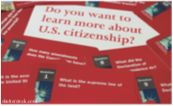In last week’s Civics 101 column, I shared information about what steps a person has to take to become a United States Citizen. I commented this week, that I would share some of the questions and answers that are actually on the U.S. Citizenship and Immigration Services Naturalization Test. The actual civics test is NOT a multiple choice test. During the naturalization interview, a USCIS officer will ask you up to 10 questions from the list of 100 questions in English. You must answer correctly 6 of the 10-questions to pass the civics test.
Certain applicants, because of age and time as permanent residents, are exempt from the English requirements for naturalization and may take the civics test in the language of their choice.
On the naturalization test, some answers may change because of elections or political appointments. As you study for the test, make sure that you know the most current answers to the questions. Answer these questions with the name of the official who is serving at the time of your eligibility interview with USCIS. The USCIS officer will not accept an incorrect answer.
The test has several parts to it. There’s an American History part, there’s a part that speaks to what your responsibilities are as an American Citizen, and there’s a Civics part. The test has a total of 100 questions. The actual test is an oral test, and you will be asked ten questions of the 100 questions you study from. You must get at least six of the ten answers correct in order to pass the naturalization test.
Just to see what we know about our country, my 16-year-old grandson and I took the test, trying to answer all 100 questions. We did ok, but in my mind, ok isn’t good enough. I later quizzed my husband on about 25 of the questions, and he got 23 of them right. Question is, how would you do if you had to take the naturalization test tomorrow? I’m talking about people who were born in America and have been educated in America and have lived here all their lives. Hmmm.

As I read the questions on the test, I recognized many of the questions, I had learned the answers years ago when I was in elementary school and junior high school. That was a long time ago, so some of that history I honestly have forgotten. Other things on the test, I feel like I should never forget, but I did.
Here are some of the American government questions and answers on the naturalization test:
What is the supreme law of the land? The Constitution.
What does the Constitution do? Sets up government. Defines the government. Protects basic rights of Americans. The idea of self-government is in the first three words of the Constitution.
What are those words? We the People.
What do we call the first ten amendments to the Constitution? The Bill of Rights.
What are two rights in the Declaration of Independence? Life. Liberty. Pursuit of Happiness.
What is freedom of religion? You can practice any religion, or not practice a religion.
What stops one branch of government from becoming too powerful? Checks and balances and separation of powers.
Who is in charge of the Executive branch of the government? The President.
Who makes federal laws? Congress. Senate and House of Representatives.
How many U.S. Senators are there? 100.
We elect a U.S. Senator for how many years? Six. The House of Representatives has how many voting members? 435.
We elect a U.S. Representative for how many years?
2.
Who is the Commander in Chief of the military? The President.

Under Rights and Responsibilities on the naturalization test to become a U.S. Citizen, here are a few of the questions:
There are four amendments to the constitution about who can vote. Describe some of them.
Citizens 18 and older can vote. Any citizen can vote, male or female of any race.
Describe one responsibility that is only for United States citizens? Serve on a jury. Vote in a federal election.
Then looking at American history on the test, here are a few of the questions they have in the practice test (keeping in mind when you take the oral exam, you never know which of the 100 questions your examiner will choose to ask of you).
What is one reason colonists came to America? Freedom. Political liberty. Religious freedom. Economic opportunity or to escape persecution. (All of the above are correct answers).
Who lived in America before Europeans arrived? American Indians. Native Americans. Both answers would be considered correct according to the test.
What group of people was taken to America and sold as slaves? Africans. People from Africa. Both answers are considered correct.
Name one problem that led to the Civil War? Slavery. Economic reasons and states’ rights.
I’ll stop there. If you want to see the full exam and take it yourself, log on at www.uscis.gov. Then under search, type in naturalization test questions.
I happen to think this is a great test to give to young people ages 12-17, just to see where they are with their knowledge about our country. This is the kind of exercise that we as parents and grandparents and other care-givers of children can do with them, over the summer in between them playing, and going to the pool and just sitting outside doing nothing. Our children need to know their African American history, American History, and World History. All of it is critical.
In next week’s Civics 101 column, we’ll explore how Federal Bills become Law. President Joe Biden just made sure that Juneteenth Day is now a Federal Holiday to celebrate when slaves in America were finally freed, (for the most part), June 19, 1865. He signed this new legislation on June 17, 2021. Thank you, Mr. President!


